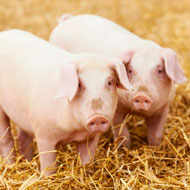No such thing as 'teacup' pigs, stresses charity

Websites listing pigs as 'teacup' or micro pigs are giving people a false impression.
Pig-lovers are being urged to think twice before 'buying into' the idea of so-called micro pigs.
The warning comes following a recent mission by Wood Green to rescue nine neglected pigs, one of which has since had a litter of three piglets.
All of the pigs were malnourished, and some required treatment for mite infestation. The charity believes the owner had been convinced the animals were of the type branded as 'micro pigs'.
Wood Green's Marie Channer commented: "When we arrived to collect the pigs you could only describe their condition as appalling. Some of them were literally skin and bone and they might not have survived much longer had we not received the call when we did".
Marie believes that websites listing pigs as 'teacup' or micro pigs are giving people a false impression that this is a breed that will not grow very big and therefore they are a good pet for the home.
"The truth is, there is no such breed as a micro pig," she said. "It is usually a cross breed and people can have no real idea of how big the animal will eventually grow.
"What we see a lot is that people deliberately breed the runt of the litter in the hope of having small pigs produced. It's terrible!"
Six pigs are now looking for a home and are being cared for at a site close to the Wood Green Godmanchester headquarters in Cambridgeshire.
"We're desperate to find some great homes for these lovely creatures. They're superb sociable animals, but they ned space, and they need someone who truly understands what looking after pigs requires, " said Marie.
"I would urge anyone who has been tempted by a website displaying micro pigs or teacup pigs to seriously reconsider. If you want to talk to an expert about pig care, then please, call us before making a purchase you may live to regret".



 The latest
The latest